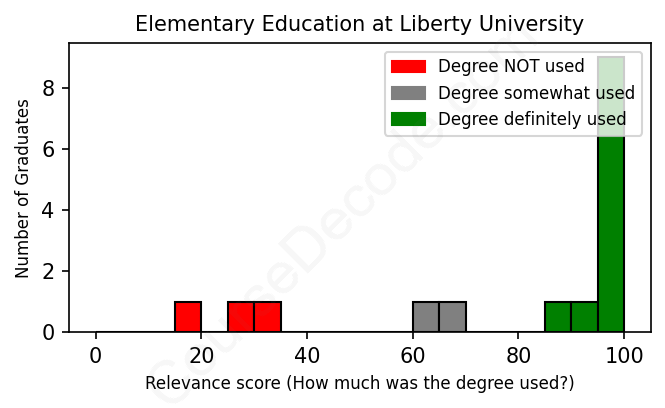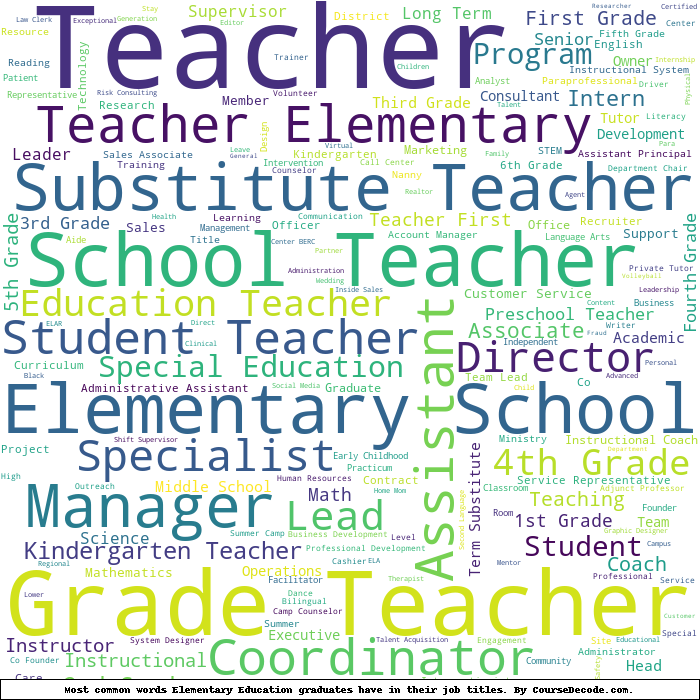
First, some facts. Of the Elementary Education graduates from Liberty University we've analyzed , here's how many have used (or NOT used) their degree in their career:

These are estimates based on AI analysis of 16 LinkedIn profiles (see below).
The verdict? Significantly above average. Overall, with an average relevance score of 80%, Elementary Education graduates from Liberty University have a much higher likelihood (+13%) of finding work in this field compared to the average graduate across all fields:
And for comparison, here's the chart for all profiles we've looked at across all degrees.
Also, after graduating, 43% of these graduates have pursued further education other than another Bachelor's degree (such as a Masters degree or other), compared to the average across all profiles of 35%. This suggests you may need more than just a Bachelors degree to be competitive as a Elementary Education graduate.
See the details:
|
Relevance score: 62% We think this person has gone into a career only somewhat relevant to their degree. We think this person has gone into a career only somewhat relevant to their degree.
DEGREE INFOGraduated in 2016 from Liberty University with a Bachelors Degree in Elementary Education. Also pursued further education since (see below). JOB HISTORY SINCE GRADUATIONElementary School Teacher Capstone Education Group Jul 2017 - Jun 2020 Sales Manager  FRSTeam, Inc. Jul 2020 - Jun 2022 Head Coach  Germantown Legends Aug 2018 - May 2023 Elementary School Teacher  Evangelical Christian School Jun 2022 - Present IT Specialist  Evangelical Christian School Jul 2023 - Present FURTHER DEGREES DONE SINCE GRADUATINGMaster of Education (M.Ed.)Union University 2016 - 2017 ABOUTNo information provided. |
The top 10 most common jobs done by the graduates we've analyzed (ranked most common to least) are:
From the analysis of LinkedIn profiles of graduates from Liberty University with a degree in Elementary Education, it's clear that many have pursued careers directly related to teaching. A significant number of them work as elementary school teachers in a variety of educational settings, such as public schools, private schools, and even international schools. These positions align perfectly with their educational training, allowing them to apply the teaching methods, communication skills, and child development knowledge they acquired in their degree program. Additionally, roles like Reading Specialists and Pre-Kindergarten Teachers further demonstrate the relevance of their education by focusing on specific aspects of early childhood learning and literacy development.
However, there's a noticeable trend where some graduates move into jobs that are less directly connected to elementary education. Positions such as realtors, administrative roles in schools, and even health benefits specialists stray from the core competencies of teaching, highlighting a range of alternative career paths that some individuals have taken. While these roles may utilize general skills or soft skills acquired in their education degree, they don't require the specialized knowledge and methodologies that define primary education teaching. Overall, it seems that a strong foundation in Elementary Education does lead most graduates back to teaching roles, but there are also exceptions where they venture into unrelated fields.
Here is a visual representation of the most common words in job titles for Elementary Education graduates (this is across all Elementary Education graduates we've analyzed, not just those who went to Liberty University):

So, looking at the career paths of graduates from Liberty University with a degree in Elementary Education, it seems like many of them kick-start their careers with teaching positions. A lot of these folks land their first jobs as elementary teachers in various school districts, which makes total sense since that's the focus of their degree. Some of them also explore roles like reading specialists or even take on responsibilities in childcare and early education settings. It's a solid start that aligns well with their background.
As they progress in their careers—say about five to ten years down the line—there's a mix of outcomes. Many continue in the education field, sometimes moving into specialized roles like ESL teaching, ministry assistantships, or even administrative jobs within school systems. However, it's interesting to note that a few have transitioned into totally different fields, like real estate or medical services. This mix showcases that while many graduates find their groove within education, others choose to branch out into diverse professions. Overall, it looks like you can definitely make a fulfilling career in education after graduating from Liberty, but there’s also a chance some may drift away from the classroom into other areas, depending on their interests and opportunities that come their way.
Getting a Bachelor’s degree in Elementary Education at Liberty University, or really anywhere, can be a mix of challenging and rewarding. Overall, it’s not the toughest degree out there, but it definitely has its tricky moments. You’ll have to juggle classes in child development, teaching methods, and educational psychology, plus a lot of hands-on practicum experiences in real classrooms. Some students find the classroom management and lesson planning aspects a bit overwhelming at first since you're really preparing to be the one in charge. So, while it might not be as stressful as something like engineering or pre-med, it still requires dedication and a genuine passion for working with kids. If you stay organized and keep an open mind, you’ll likely find it manageable!
Most commonly, in the LinkedIn profiles we've looked at, it takes people 4 years to finish a Bachelor degree in Elementary Education.
Alright, so looking at these Liberty University grads, it seems like they’re mostly sticking with teaching jobs, which isn’t the easiest way to stack up cash. Elementary teachers generally earn a decent salary, but it often isn’t enough to make bank, especially since many are in early-career positions or moving into roles that don’t pay a ton more. Some have switched to other jobs like real estate or medical roles, and those might pay better, but it seems like a lot of them are still in education-related jobs. Overall, I wouldn’t say they’re raking it in, but they seem to be making a comfortable living while doing what they love. Just don’t expect them to be billionaires anytime soon!
Here is a visual representation of the most common words seen in the "about" section of LinkedIn profiles who have a Bachelor degree in Elementary Education (this is across all Elementary Education graduates we've analyzed, not just those who went to Liberty University). This may or may not be useful:

Here are all colleges offering a Bachelor degree in Elementary Education (ordered by the average relevance score of their Elementary Education graduates, best to worst) where we have analyzed at least 10 of their graduates: